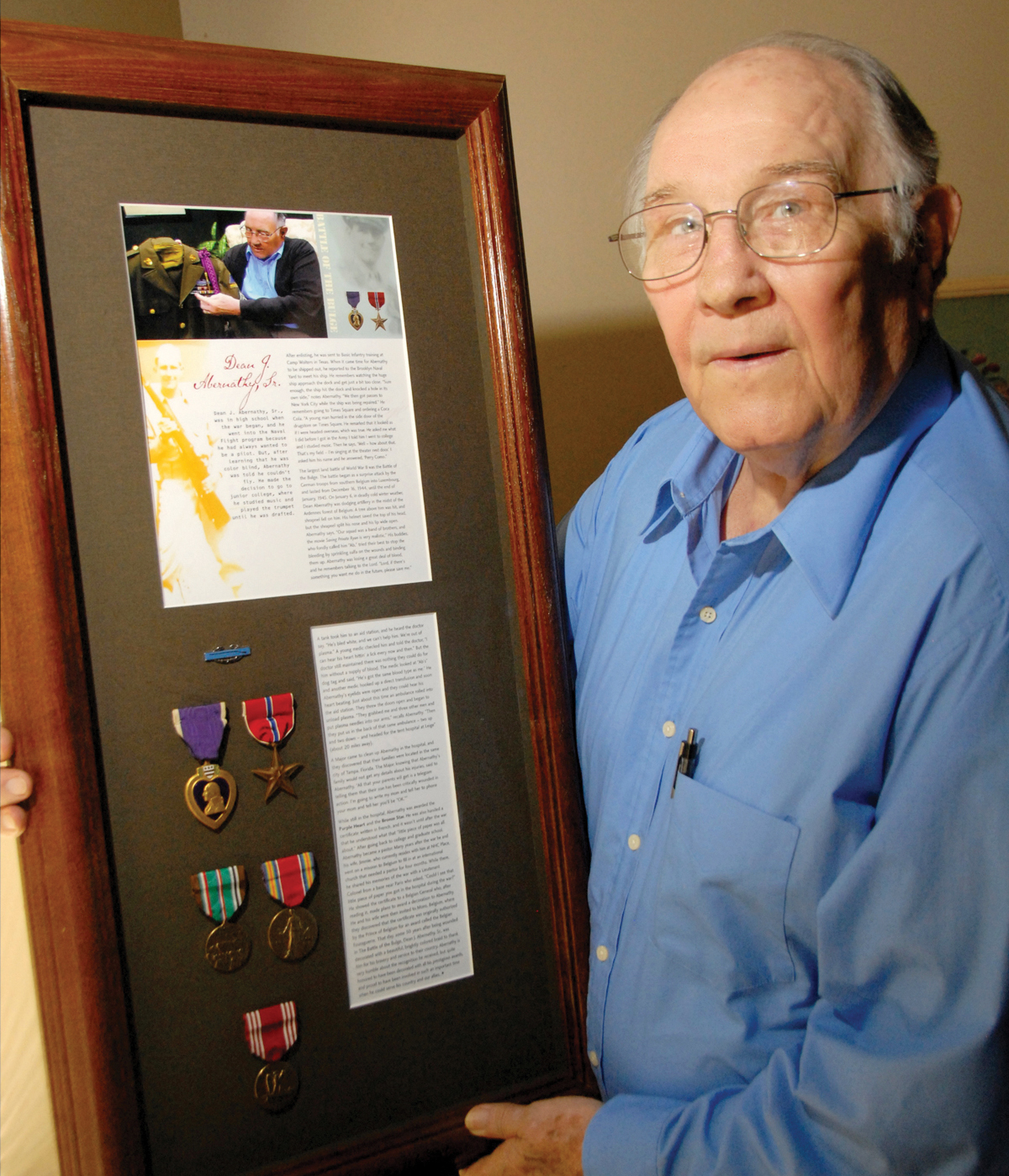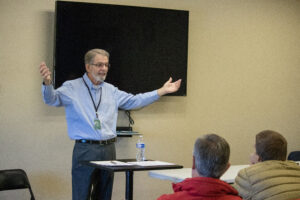
JACKSONVILLE, Fla. (BP)–After D.J. (Dean) Abernathy was injured during the Battle of the Bulge in 1944, he says at least two angels saved him from death.
The angels, an Army medic and a surgeon, stepped in to save the young infantryman who had been pronounced a hopeless case by an aid station doctor.
Abernathy is a retired pastor and Florida Baptist Convention lobbyist.
When a German shell created a “tree burst” over Abernathy’s head in Europe’s Ardennes forests, shrapnel rained down on the soldier. His steel helmet prevented a brain injury, but the lip of the helmet left his nose and mouth unprotected.
“But for the helmet, it would have finished me off,” he told the Florida Baptist Witness newspaper.
Quickly losing blood from a “split-open” nose and lip, the 25-year-old soldier crawled in snow under a barbed wire fence and waved down a passing tank, praying it was an American vehicle.
“I was really talking to the Lord, and when I heard, ‘Hey, he’s down here in the ditch,’ I knew they were Americans,” Abernathy recounted.
In the aid station, a doctor told the medics who had brought Abernathy in that he had “bled white” and was going to die because the station was out of plasma.
After the doctor turned to another patient, the medic — regretfully nameless to Abernathy — checked his dog tag to see his blood type and said to another medic, “He and I are the same type.” The men rigged up an intravenous tube directly from the medic’s arm to Abernathy’s.
Within five minutes the young soldier regained consciousness, and a truck pulled into the station with a load of plasma.
After only six months with the 2nd Armored Division fighting in France, Holland, Luxembourg and Germany, the wounded soldier was shipped to Kennedy General Hospital in Memphis, Tenn., the nearest hospital to Abernathy’s family hometown of Hannibal, Mo.
Abernathy said he encountered a second angel at the Memphis hospital. The doctor preparing to do surgery on his nose and lip was from Tampa, and he told Abernathy he would write to his mother there , where the Abernathy family had recently moved, and ask her to call Abernathy’s mother to let her know that her son would survive his injuries.
The surgeon took skin from the inside of Abernathy’s arm to patch his face.
While recovering, Abernathy received 30 days leave to visit Tampa, his first time to the city. In his uniform at Riverside Baptist Church, he met Jimmie Morris, his sister’s friend. The two began writing letters, falling in love through the mail.
She was at his house when he returned to Tampa in late October 1945. Abernathy worked as a butcher at Margaret Ann Supermarket in Tampa and saved money to marry Jimmie and study music at Furman University in Greenville, S.C. The couple married on June 6, 1946, and moved north to Greenville. A year later the first of their three children was born.
While studying music at Furman and working as a night watchman and paid choir section leader, Abernathy began rethinking his planned career in music.
“The Lord was working on me to preach the Gospel, so I went to Southwestern Seminary with a new ambition,” he recounted.
After graduation from the Baptist seminary in Texas, Abernathy served Jackson Heights Baptist Church in Tampa for five years. He subsequently served Hickory Grove Baptist Church in Charlotte, N.C., and returned to Florida to lead North Park Baptist Church in Orlando, where he served 13 years. He preached the convention sermon at the annual meeting of the Florida Baptist Convention in 1975, following in the footsteps of his father who also preached the convention sermon years before, and the younger Abernathy was elected second vice president of the state convention.
While pastoring in Florida, Abernathy became involved in the activities of United Christian Action, an interdenominational political organization established under the leadership of then-Florida Baptist Convention Executive Director John Maquire. In 1978, Maquire asked Abernathy to lead the organization, and the Florida pastor headed the organization until it disbanded in 1990.
As a lobbyist in the Florida legislature, Abernathy worked to influence legislators on bills “in the area of righteousness,” he said. He also wrote articles frequently on legislative issues for the Florida Baptist Witness.
“It was a tough job, and it was not all good news, but it was helpful news,” he said.
When the UCA ended, then-editor Jack Brymer of the Witness asked Abernathy to join the staff as a circulation promoter. He traveled the state “talking with pastors about putting the Witness in their church budgets.” He also told about his family mailing the Witness to him when he was a young soldier fighting in Europe.
“A little bit of my heart will always be with the Florida Baptist Witness,” Abernathy said.
After retiring from his work with the convention and with the Witness, D.J. and Jimmie Abernathy moved to their mountain cabin in Ridgecrest, N.C., where they lived several years until health problems forced them to move to an assisted living facility in Franklin, Tenn., near their children. Abernathy said he depends on the Lord now just as he did in battle in 1944.
“We’re coming along,” Abernathy said. “This side of life is pulling on us, but the Lord is helping us.”
–30–
Carolyn Nichols is a newswriter for the Florida Baptist Witness, online at gofbw.com.















